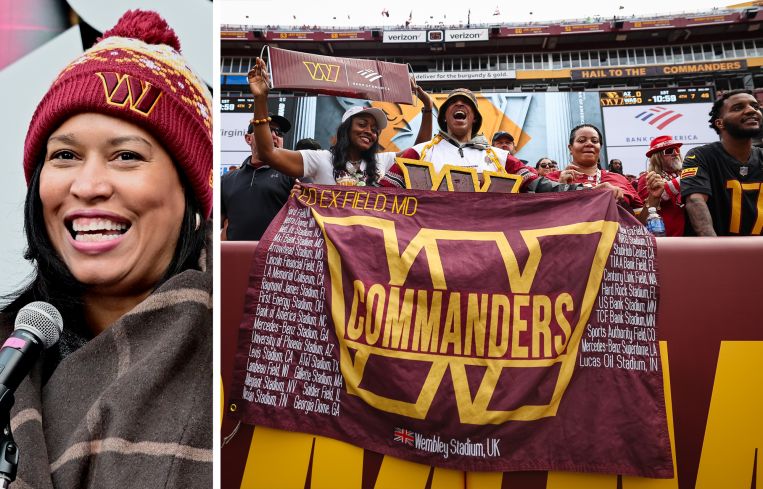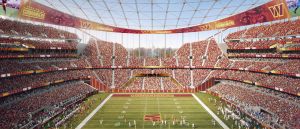Washington Commanders Plan Return to D.C. After 29 Years
NFL team and the District aim to co-develop a roughly $3.6 billion, 180-acre overhaul of both RFK Stadium site and the surrounding area
By Nick Trombola April 28, 2025 1:48 pm
reprints
After nearly 30 years of exile in Maryland, the Washington Commanders football team has reached a deal with Washington, D.C., officials to finally bring the team back home.
The Commanders organization and D.C. plan to co-develop a roughly $3.6 billion, 180-acre overhaul of D.C.’s RFK Stadium site, a 45,000-seat husk that has stood vacant since 2017, and the surrounding area into a sprawling, multi-district neighborhood to support the franchise, according to an announcement Monday from D.C. Mayor Muriel Bowser, Commanders Managing Partner Josh Harris and NFL Commissioner Roger Goodell. The Commanders will foot the majority of the bill for the project, at least $2.7 billion, according to the organization — provided that the deal wins approval from the D.C. Council.
The funding is the single, largest private investment in D.C. history, according to Commanders officials.
“Today is a defining moment for the DMV and the Washington Commanders,” Harris said in a statement. “RFK Stadium holds a legendary place in our history. It’s where the team dominated the NFL, capturing three Super Bowls and creating unforgettable memories for fans. Now, we have the opportunity to honor that legacy by building a new world-class stadium, one that is also a once-in-a-generation catalyst for uplifting and transforming our region. … RFK was once a place our fans loved, and opponents feared — we’re determined to make it that way again.”

Plans include a brand-new, 65,000-seat, roofed stadium, along with four distinct districts surrounding the arena. The Commanders will take the lead on developing the stadium, expected to open by 2030 if approved. The franchise will also lead the development of the Plaza District west of the field, which will contain housing, hotels, retail and restaurant spaces, and the Riverfront District, a new community southeast of the field with yet more housing, retail and restaurants.
D.C. will, meanwhile, lead development of the Kingman Park District, a housing and recreation area north of the field; the Recreation District, which will include an $89 million “Sportsplex” for indoor track, gymnastics and other activities northeast of the field; and Anacostia Commons, a winding, 30-acre community space on the banks of the Anacostia River.
All told, officials expect the project to produce between 5,000 to 6,000 new housing units, at least 30 percent of which is earmarked as affordable.
Along with the Commanders’ contribution, the District would kick in about $883 million toward the project. That includes $500 million via leveraging funds from the city’s sports facilities tax, which it levies on D.C. businesses with more than $5 million in annual gross receipts; $202 million for utilities infrastructure, roadways, and a Washington Metropolitan Area Transit Authority (Metro) transit study; and $181 million from Events D.C. toward parking garages near “community recreation facilities.”
The city will additionally pay $175 million for further parking development using a revenue bond funded by in-stadium activity by 2032, per the Commanders. The entire campus will contain about 8,000 parking spots, officials said.
“We said that we could do it all — Commanders, housing, park space, recreation, retail, entertainment and more — and, together, that’s what we are delivering,” Bowser said in a statement. “When we got control of 180 acres of land on the banks of the Anacostia, we knew right away that partnering with the Commanders would be the fastest and surest route to bringing the RFK campus to life. As we focus on the growth of our economy, we’re not only bringing our team home, but we’re also bringing new jobs and new revenue to our city and to Ward 7.”
Founded as the Boston Braves in 1932, the football franchise moved to D.C. in 1937. D.C. Stadium opened in late 1961, and was renamed eight years later to honor the late Robert F. Kennedy. The team’s tenure there would last for about 35 years, playing their last game at the storied stadium in December 1996 before moving to FedEx Field in Landover, Md., in 1997, where it has played since. RFK Stadium’s last tenant, professional soccer club D.C. United, left in 2017.
The prodigal football team’s return to D.C. is a particularly big win for Bowser, who has pushed hard for the repatriation since becoming mayor in 2015. Much of the delay came from years of general malaise via the federal government, which owns the land underneath the stadium site. Yet the District ultimately gained control of the area in December, after Congress passed a bill handing over its administrative power to the District for 99 years. The bill allows for commercial and residential redevelopment of the area, though forbids federal funds from being used for the project and requires the reservation of green space along the Anacostia River, which D.C.’s planned Anacostia Commons district will provide.
If ultimately approved by the D.C. Council, the Commanders’ homecoming would also be a welcome point of relief for a city in trouble on multiple fronts. Aside from dismal office vacancy numbers, the Trump administration’s aggressive cuts to the federal government are expected to hit the District hard, as the federal workforce is trimmed and D.C. buildings owned or leased by the feds are disposed of. D.C.’s Office of Revenue Analysis projected in March a loss of up to 40,000 federal workers as a result of the administration’s cuts — roughly 21 percent of the city’s federal employees.
Along with a Metro system that has been on shaky financial ground for years, the District is also scrambling to find $400 million in budget cuts stemming from the federal government’s ongoing spending package saga. As of Monday, the House of Representatives has not yet approved a fix to the spending bill, which effectively relegates the District’s Fiscal Year 2025 budget to the previous year’s level, a difference of over $1 billion.
Still, the Commanders’ return is actually the second major sports win for Bowser recently. The mayor and Ted Leonsis, owner of Monumental Sports & Entertainment, which owns the Washington Wizards and Capitals, reached a deal early last year to keep the NBA and NHL teams in the District with a $515 million commitment to renovating Capital One Arena in the city’s Chinatown neighborhood.
Nick Trombola can be reached at ntrombola@commercialobserver.com.



